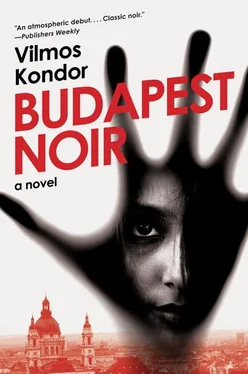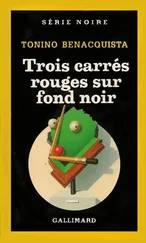Mór thought it over one more time, and finally he stood up and went into the bedroom. In a couple of minutes Gordon heard the bathroom door open, then close. Ten minutes later Mór stood before him in a dapper black suit, a tight-fitting vest, the thick gold watch chain hanging from a pocket, a hard felt hat on his head, and a wolf head walking stick in his hand. Unusually, even his mustache and beard looked neat and trim.
At the Circle they boarded the underground that ran the length of Andrássy Street, and they got off at the Oktogon. From there they went on foot, turning from Andrássy Street onto Nagymező Street, and from there to Ó Street. The Arabia Coffee office building, a stately edifice that stood practically across from Arany János Street, had the company’s well-known logo on its façade: an Arabian man whose eyes alone gleamed from his face, which was otherwise covered by his raised arm. Mór took a deep breath, and after adjusting his hat and twirling his mustache, he went inside.
Gordon had a smoke while waiting. Behind him, buses and trams came and went, cars beeped their horns, and a cop kept blowing his whistle. Not even ten minutes had passed when Mór stepped out the front door of the Arabia Coffee building.
“He’ll be there,” he told Gordon.
“Did everything go okay?”
“Everything,” replied the old man.
“Well, Opa, I thank you. Krisztina will be getting to your place around seven this evening. She’ll be angry, for good reason, but not at you.”
“What did you do with her?”
“Nothing special, Opa. I left her there in Lillafüred to rest a bit more.”
“Then why will she be angry?”
“Because I didn’t exactly talk this over with her. I’ll calm her down later. The point is that you should just wait for me there. As soon as I’m done, I’ll head on over to your place.”
“And now?”
“I’m off to the boxing arena,” replied Gordon. The old man nodded, then headed with slow, labored steps back toward Ó Street as Gordon boarded a bus.
There wasn’t much of a crowd at all in the boxing arena at the Ironworks Sport Club, which was not surprising. The training bouts didn’t draw much public interest. So when Gordon stepped inside, he saw Strausz immediately beside one of the rings. A thin cigar in his hand, he was watching the boxers go at it. Gordon realized that one of the boxers was none other than Bruno Butcher. He walked over to Strausz.
“You out to polish this diamond?” Gordon asked the coach. Strausz looked at Gordon and gave a dismissive wave of the hand.
“Who the hell knows what’ll become of him. I thought I’d give it a try, that maybe I can carve a bona fide boxer out of the guy. Never mind that he’s sluggish; that, you can do something about. But his head! That’s where the problem is. He thinks it’s enough to throw a helluva punch, and that’s that, he’s the winner.”
“But he can throw a helluva punch, right?”
“A mother of a helluva punch, no question there. But if he finds himself up against a faster opponent, someone with technique, why then he can have all the strength in the world, he’s still gonna end up on the mat.” Strausz took a drag of his cigar, then stepped over to the ring. “Bruno, Bruno!” he shouted. “Don’t just move that arm! Move your legs, too. I’m not asking you to dance, but don’t just stand there like half a hog up against a wall.” Bruno Butcher gave a nod with his thick head and took two steps to the side, whereupon his opponent went at him and Bruno leveled a punch on the other man’s chin as hard as if he’d whacked a cow upside the head.
“That’s more like it!” snapped the old man. “You see, this is what happens. I tell him what to do, we go over it again, he steps in the ring, and then he knocks his opponent flat in no time.”
“Not bad.”
“Of course it’s not bad, but before long I won’t be able to find him a decent sparring partner. This blockhead knocks everyone out, as if this were a slaughterhouse, and then he just stands there looking like a nincompoop.” Strausz opened his arms wide. Bruno Butcher meanwhile stood about, looking befuddled, arms down, as his opponent groaned away below him on the mat.
“Come on out of there, Bruno,” said Strausz. “And then go on home. I’ll let you know if I find someone else for you to knock out.”
Bruno Butcher climbed out of the ring and, head drooped, headed off toward the locker room.
“I got your message,” said Gordon.
Strausz sat down in one of the chairs and gestured to Gordon to take a seat beside him. “You know, I really don’t like this whole affair. Antal Kocsis was supposed to be here, too, but something came up for him, and so he asked me to tell you what he found out.”
“What’s it you don’t like?”
“This whole Pojva affair,” Strausz anxiously replied. “I asked around a bit. Pojva is worse than ever. He’ll knock the brains out of anyone for twenty pengős.” Looking at Gordon’s wounded forehead and faintly swollen lip, he added, “For ten pengős, he’ll do it halfway.”
“Ten pengős?” asked Gordon.
“That’s right.”
“I would have done better giving him ten pengős to lay off me,” said Gordon.
“The sort of character he is, he would have taken your ten pengős and then beat you good just because. But all that’s nothing, compared to the illegal matches. Nothing interests him except money.” Strausz shook his head. “For fifty pengős he’ll let any opponent beat his face to a pulp. You know what the funny thing is?”
“Is there anything funny about this?”
“Just that everyone knows this about him, and lots of folks bet on him, anyway. Because I don’t even have to say how much the bookies rake in on this sort of . . .” He searched for the right word. “ . . . brawl . Because this isn’t sport. This doesn’t have anything to do with boxing.”
“When is he fighting next?”
“Tomorrow night,” Strausz replied.
“Where?”
“You want to go there?” said Strausz, raising his eyebrows.
“I do,” said Gordon.
“Whatever. It’s on Gubacsi Road in southern Pest, by the river and next to the Slaughterhouse Bridge, on the grounds of a factory. Supposedly it begins at six.” Strausz hesitated for a moment before continuing. “You know where to find this Pojva fella?” he finally asked.
Gordon recalled his last meeting with Gellért. “Out in that slum,” he said, “the Mária Valéria Colony. And who is he up against?”
“The name’s Jacek,” said Strausz. “A Polish kid. He’s slow; he’s a blockhead. Just about the same as Bruno Butcher, but if someone gets his temper up, this guy can dole out ruthless punches, I’m telling you. And he works right there in the neighborhood, at the slaughterhouse. Maybe there really is something about butchers.”
“Thanks,” said Gordon.
“Don’t thank me. I get sick thinking about this stuff.”
“So do I.”
“And you haven’t even seen them brawl yet.”
“I’m not too happy about going, but I need to be there. And now I’ve got to be off; I’m due in Buda at five.”
“You’re writing an article about some gentlemen?”
“Something like that,” Gordon replied. “Except it’s not exactly an article and not about gentlemen.”
Gordon caught a bus back to the intersection of Kaiser Wilhelm Road and Nagymező Street. He got off and looked at his watch. Just past four. If he hurried, he’d make it to Buda by five. A couple of minutes later he shut the door behind him in his flat on Lovag Street and went over to his desk. Removing the stenciled copies of his notes from his blazer pocket, he slid one beside the copy of the autopsy report while placing the rest in the drawer. He quickly changed his shirt and was on the road in no time.
Читать дальше
Конец ознакомительного отрывка
Купить книгу












